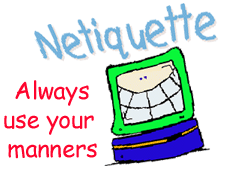Through the lesson, I narrowed it down to some easy to remember facts everyone should try to remember when using the internet to communicate:
- Don't send out unecessary e-mails.
- Use respectful language. Remember, there are people on the other end reading what you have written. Think about how your message will be read and ultimately be recieved.
- Watch out how you use capital letters. Some readers take it that the writer is shouting, and being overall rude.
- Always check your facts before you post them or send them. And cite if possible!
- Before you ask the questions, see if the answers are already there! Research to find the answers to save yourself some time. If you still cannot find it, then it is okay to ask.
- Answer the question if you think you know it. You will be helping someone out! Plus, they may help you out with an unknown question later on.
I found this interesting Web site that lists ten rules of netiquette from the writer's perspectice.The URL is the following:
One aspect of this particular Web site is "Rule #2: Adhere to the same standards of behavior as you would in real life." The most important subheading under this rule is "Be Ethical." Truly, act online as you would in real life. It's obvious you would not speak false information to large groups of people in real life, so why do it on the internet? It it is false and damaging information, you may get in trouble for it.
